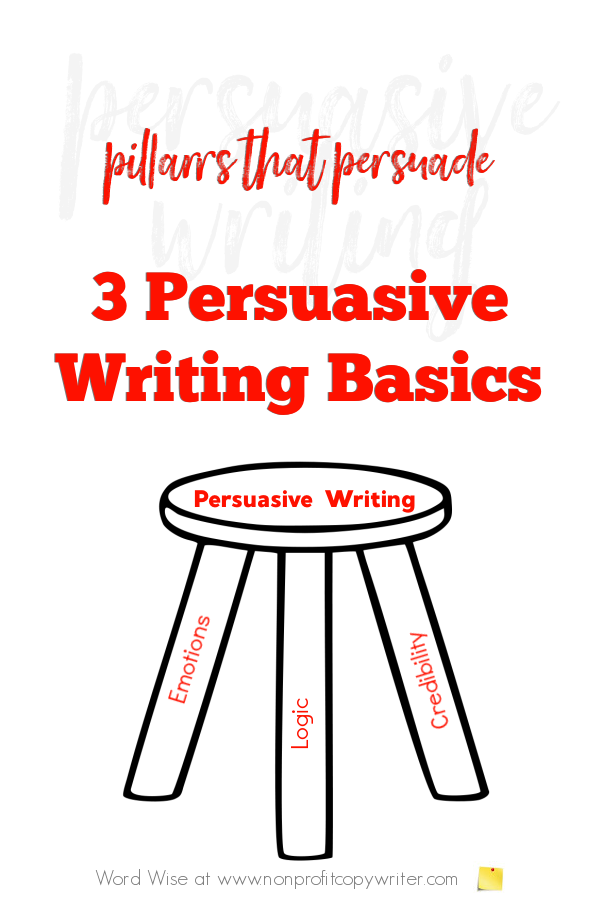Save Time: Get 5 Simple Writing Tips
you can put to use in 10 minutes
Pillars that Persuade: Understand the 3 Persuasive Writing Basics
Award-winning writer Kathy Widenhouse has helped hundreds of nonprofits and writers produce successful content , with 750K+ views for her writing tutorials. She is the author of 9 books. See more of Kathy’s content here.
Updated 1.5.25
Three persuasive writing basics undergird all persuasive writing.
They’re like pillars. A pillar provides a building with essential support. Without it, the structure crumbles.
The same is true with the three pillars of persuasive writing. They are principles that provide a foundation for persuasive writing. All three, combined, bolster your argument and convince the reader to act. If one of these persuasive writing basics is missing from your piece, then fewer readers will be persuaded to embrace your argument, your cause, or your request.
You put these three basics into words using persuasive writing techniques. These methods or devices – storytelling, repetition, or social proof, for example – explain to the reader why she should take action.
But underlying all those techniques are the three persuasive writing basics – the pillars – that ensure your content is convincing and will move readers to act.
3 Persuasive Writing Basics
Pillar #1: Emotion
Human beings are content to stay in one place. We need motivation to break out of our comfort zones. Emotions are a driving force in moving readers out of a rut. Persuasive writing points out a problem to the reader and rouses her emotions about that problem. Emotions propel readers to act.
You can rouse emotion with different persuasive techniques: you can tell a good story that engages a reader’s heart. You can identify with the reader to give her assurance and make her feel part of a group. You can offer a guarantee to drive away fear. You can share an insightful example with power words that jar a reader’s senses.
But while arousing emotions is fundamental to persuasion, emotions alone cannot persuade a reader to click, type a response, make a phone call, or enroll in a course. Readers are comfortable. They need to justify a change. That’s why in addition to emotions, every piece of persuasive content also needs …
Pillar #2: Logic
A persuasive argument appeals to a reader’s rational mind. Logic verifies your premise with proof. Persuasive writing techniques can help with that: share a current statistic, a clear fact, a quote from a notable source, or a testimonial from an expert. Evidence, like these, allow the reader to validate the feelings you’ve aroused by presenting the problem and offering a solution.
Seems ironic, doesn’t it, that persuasive content needs both emotion and logic to convince a reader to act? But when you pause to think about it, the balance between these two persuasive writing basics makes sense. Emotion motivates a reader to act. Logic justifies that action. Content that is logical as well as emotional offers a one-two punch. Especially when you write with …
Pillar #3: Credibility
If your content is credible, readers are more likely to be persuaded. They assume you have something valuable to say and will keep reading in order to discover it. Without credibility, readers have low expectations and are less likely to take you seriously.
Notice I said that your content needs to be credible – not your pedigree. While qualifications can increase your standing in readers’ eyes, loads of writers have degrees, certifications, and experience but lack credibility. Their content offers a poorly-constructed premise, shoddy research and citations, or untruths. You don’t respect writers who pump out that kind of work, do you?
Quality work oozes authority. Well-conceived, well-written material earns trust. And before you get nervous and worry that your content isn’t up to snuff, simply run it through this credibility checklist. Ask yourself …
- Does this piece have a clear point?
- Have I engaged my reader’s emotions by pointing out a problem?
- Have a offered a solution with well-supported logic?
- Are my references well-documented?
- Have I proofread my work to ensure that it’s error-free?
Answer no to any of those questions? Then go back and fix the problems. But answer yes to those questions and your credibility rank will rise with your readers.
Underpin Your Content With the 3 Persuasive Pillars
Underpin your content with three persuasive writing basics: rouse emotions by pointing out a problem. Offer a logical solution or explanation to validate the reader’s feelings, backed up by sound facts. And present your case well and offer value to your readers.
The result? Your persuasive content is well-supported on three, balanced pillars.
And readers are persuaded to act.
More Persuasive Writing Tips
The 7 Most Powerful Words in Persuasive Content...
Top 10 persuasive copywriting techniques ...
Persuasave Writing: Facts Tell, But Stories Sell ...
Want to Persuade? Use the World’s Most Powerful Word ...
Use These 5 Persuasive Techniques in ANY Piece of Writing ...
Use A FOREST as a Persuasive Writing Checklist ...
Use This Simple Features vs Benefits Exercise to Avoid Deadly Boredom ...
Persuasive writing techniques: the one question you MUST answer ...
Persuasive writing techniques : write to real person ...
Persuasive writing techniques: tell a good story ...
Persuasive writing techniques: give factual proof ...
Persuasive writing techniques: offer social proof ...
More persuasive writing tips on our Pinterest board ...
Return from 3 Persuasive Writing Basics to Nonprofit Copywriter home
As an Amazon Associate I earn from qualifying purchases.
Share This Page

Named to 2022 Writer's Digest list
BEST GENRE/NICHE WRITING WEBSITE


Stop Wasting Time!
Grab your exclusive FREE guide, "5 Simple Writing Tips You Can Put to Use in 10 Minutes or Less"












